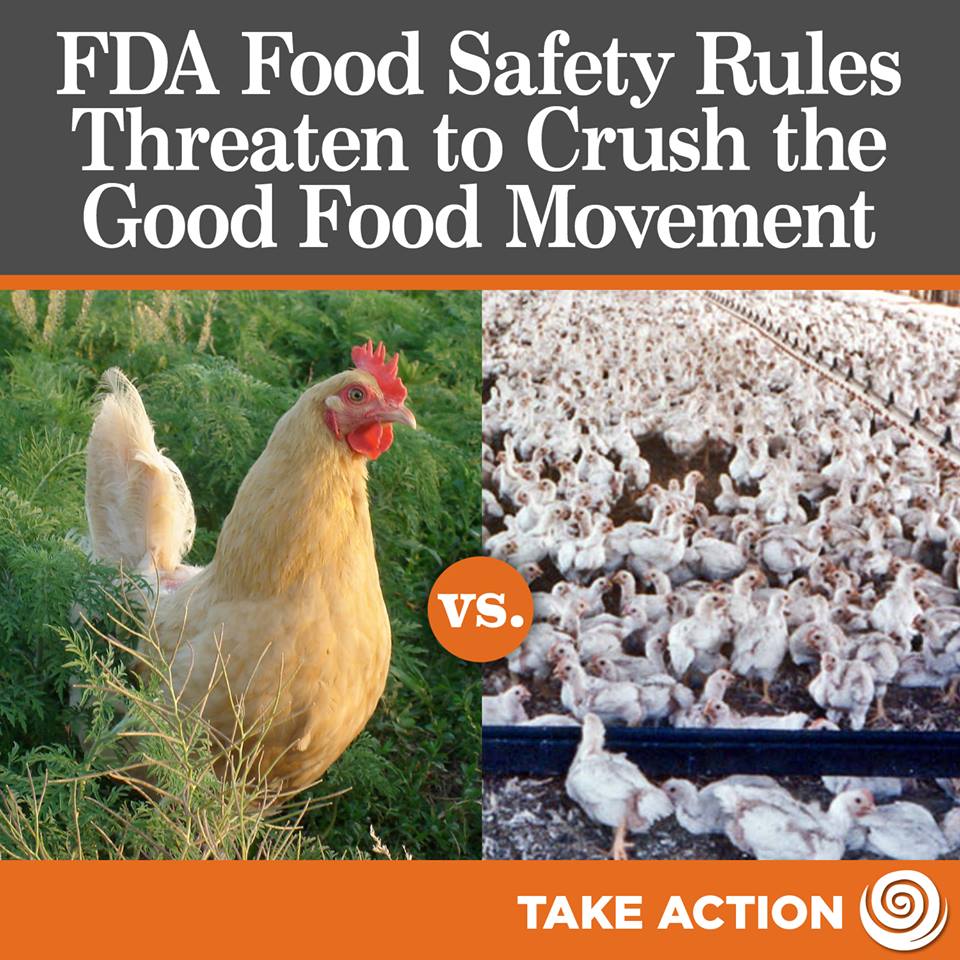You have until midnight tonight (Eastern) to send a brief electronic message to the FDA. Their proposed guidance on preventing salmonella contamination of eggs turns logic and science on its head. The FDA wants to crack down on organic flocks with outdoor access while flagrantly ignoring documented food safety issues on giant factory farms.
Click here to comment directly to the FDA.
The egg guidance lacks scientific merit and will hasten a shift of organic production to CAFOs. Here’s why:
The draft guidance makes it expensive and impractical to provide legitimate outdoor access for commercial-scale organic flocks. At the same time, in concert with the USDA, the FDA institutionalizes tiny screened structures as meeting the legal requirement for “access to the outdoors.” The FDA has ignored published research that suggests public safety would be improved by addressing giant older buildings, caged production and forced molting.
- Requiring outdoor flocks to be totally isolated from birds and other wildlife is unreasonable given that published, peer-reviewed science shows no increase in salmonella risk from allowing birds outside in a natural environment.
- The mechanism suggested by the FDA to prevent contact with wild birds and mammals would be expensive, impractical and could very well do away with true outdoor access. Putting a roof or bird netting over an entire outdoor run or pasture would be impossible to execute on a commercial basis.
- The FDA’s alternative of using noise cannons, a method vegetable and fruit farmers use to scare away wild birds eating their produce, would likely scare the chickens as well. The regulatory agency supplies no research supporting this recommendation.
- Giving industrial-scale producers the option of using a small porch – capable of holding only a tiny percentage of a flock – is a betrayal of organics and will give these CAFOs an unfair competitive advantage over real organic farmers.
- The agreement reached with the USDA’s National Organic Program “blessing” these tiny porches is a violation of law that will be challenged in court. The regulations governing the Organic Foods Production Act of 1990 clearly require access to the “outdoors” for all organic livestock including laying hens. Small enclosed porches, with roofs, ceilings and walls, are not the “outdoors.”
Click here to comment directly to the FDA (deadline 11:59 p.m. Eastern).
(Cornucopia’s original action alert appears below)
———————————————————————————-
No More Organic Eggs?
Act Today to Protect Organic Egg Producers
The FDA is zeroing in on egg farmers who provide outdoor access (required in certified organic production) for their flocks. The agency has issued a Draft Guidance that will make it difficult, expensive and perhaps even impossible to maintain medium-sized poultry flocks outdoors.
This could spell the end for commercial-scale, truly organic eggs where hens live outdoors, free to exhibit their native behaviors, as required by the USDA’s organic regulations. The FDA’s guidance seeks to prevent outbreaks of Salmonella Enteritidis in shell eggs, and was sparked by a major 2010 salmonella outbreak in eggs, centered on “factory farms” in Iowa, confining tens of thousands of hens indoors in filthy and dangerous conditions.
The fact is, based on published-reviewed research, that the biggest risk to human health comes from caged hens in giant factory farms—not organic birds enjoying a good life outdoors!
The comment period on this guidance ends on
Monday, September 23.
Click here to voice your concerns to the FDA.
In this guidance, the FDA appears to have colluded with a willing USDA to determine that a tiny enclosed porch, attached to a giant poultry house, constitutes acceptable outdoor access. To comply with federal organic law, the FDA must delete the “Indoor Area with Porch” as one of the four housing styles acceptable for organic production.
Many of the FDA’s recommendations for avoiding contact with wild birds and other wildlife — as salmonella prevention measures — are logistically and economically impractical, and risk putting undue burdens on organic producers who follow the spirit and the letter of the organic law and regulations.
For example, netting entire outdoor runs/pasture and putting up expensive new fencing, would be cost-prohibitive and impractical. Use of noise cannons would presumably scare the hens as well as wild birds, and hens would be discouraged from going outdoors (there is no research presented to suggest otherwise).
The FDA was highly selective in citing scientific studies supporting its conclusion that contact with wild birds should be minimized. For further in-depth analysis of the relative risks associated with conventional, confinement egg production, and eggs from certified organic farms with access to the outdoors, see Cornucopia’s 2011 scientific literature review.
Please act today to protect access to authentic organic eggs!
Please submit your comments directly to the FDA, via their website, by the end of the day MONDAY!
(Even if you’ve executed and mailed one of the proxy letters, you can still amplify your voice by making an additional electronic comment now.)


